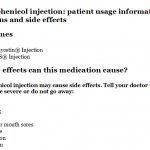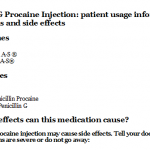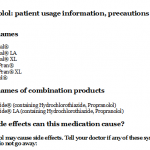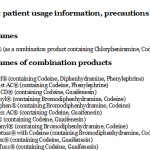
Dactinomycin: patient usage information, precautions and side effects
Tuesday, May 30, 2017 by Gregory Van Dyke
http://www.naturalnewsreference.com/2017-05-30-dactinomycin-patient-usage-information-precautions-and-side-effects.html
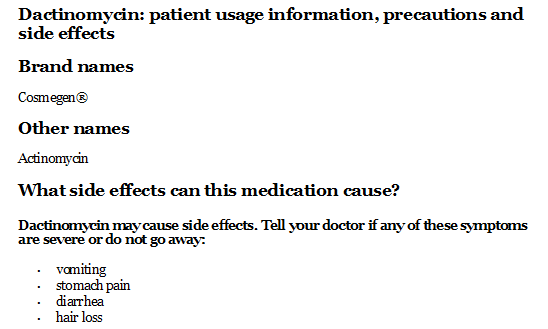
Dactinomycin: patient usage information, precautions and side effects
Brand names
Cosmegen®
Other names
Actinomycin
What side effects can this medication cause?
Dactinomycin may cause side effects. Tell your doctor if any of these symptoms are severe or do not go away:
- vomiting
- stomach pain
- diarrhea
- hair loss
Some side effects can be serious. If you experience any of these symptoms or those listed in the IMPORTANT WARNING section, call your doctor immediately:
- hives
- rash
- difficulty breathing or swallowing
- nausea
- extreme tiredness
- unusual bleeding or bruising
- sores in the mouth and throat
- lack of energy
- loss of appetite
- pain in the upper right part of the stomach
- yellowing of the skin or eyes
- fever, sore throat, ongoing cough and congestion, or other signs of infection
- unusual bleeding or bruising
- black and tarry stools
- red blood in stools
Dactinomycin may increase the risk that you will develop other cancers. Talk to your doctor about the risks of receiving dactinomycin injection.
Dactinomycin may cause other side effects. Call your doctor if you have any unusual problems while taking this medication.
If you experience a serious side effect, you or your doctor may send a report to the Food and Drug Administration’s (FDA) MedWatch Adverse Event Reporting program online (http://www.fda.gov/Safety/MedWatch) or by phone (1-800-332-1088).
IMPORTANT WARNING:
Dactinomycin injection must be given in a hospital or medical facility under the supervision of a doctor who is experienced in giving chemotherapy medications for cancer.
Dactinomycin should be administered only into a vein. However, it may leak into surrounding tissue causing severe irritation or damage. Your doctor or nurse will monitor your administration site for this reaction. If you experience any of the following symptoms, call your doctor immediately: pain, itching, redness, swelling, blisters, or sores in the place where the medication was injected.
Why is this medication prescribed?
Dactinomycin is used in combination with other medications, surgery, and/or radiation therapy to treat Wilms’ tumor (a type of kidney cancer that occurs in children) and rhabdomyosarcoma (cancer that forms in muscles) in children. Dactinomycin is also used in combination with other medications to treat certain types of testicular cancer and Ewing’s sarcoma (a type of cancer in bones or muscles). Dactinomycin is also used alone or in combination with other medications to treat gestational trophoblastic tumors (a type of tumor that forms inside a woman’s uterus while she is pregnant). Dactinomycin may also be used to treat certain types of cancerous tumors that are located in a specific area of the body. Dactinomycin is a type of antibiotic that is only used in cancer chemotherapy. It works by slowing or stopping the growth of cancer cells in your body.
How should this medicine be used?
Dactinomycin comes as a powder to be mixed with liquid to be injected intravenously (into a vein) by a doctor or nurse in a medical facility. The length of treatment depends on the type of cancer you have, the types of other drugs you are taking, and how well your body responds to treatment. Your doctor may need to stop or delay your treatment if you experience certain side effects. Dactinomycin may also be injected by a doctor directly into a specific the part of the body or the organ to treat the area where a tumor is located.
Ask your pharmacist or doctor for a copy of the manufacturer’s information for the patient.
Other uses for this medicine
Dactinomycin is also sometimes used to treat a type of cancer of the ovaries (a cancer that begins in the female reproductive organs where eggs are formed). Talk to your doctor about the risks of using this medication for your condition.
This medication may be prescribed for other uses; ask your doctor or pharmacist for more information.
What special precautions should I follow?
Before receiving dactinomycin,
- tell your doctor and pharmacist if you are allergic to dactinomycin, any other medications, or any of the ingredients in dactinomycin injection. Ask your pharmacist for a list of the ingredients.
- tell your doctor and pharmacist what other prescription and nonprescription medications, vitamins, nutritional supplements, and herbal products you are taking or plan to take.
- tell your doctor if you have chickenpox or herpes zoster (shingles). Your doctor will probably not want you to receive dactinomycin injection.
- tell your doctor if you have previously received or are currently receiving radiation therapy.
- tell your doctor if you are pregnant, plan to become pregnant, or are breast-feeding. You should not become pregnant or breast-feed while you are receiving dactinomycin. If you become pregnant while receiving dactinomycin, call your doctor. Dactinomycin may harm the fetus.
- do not have any vaccinations without talking to your doctor.
In case of emergency/overdose
In case of overdose, call your local poison control center at 1-800-222-1222. If the victim has collapsed or is not breathing, call local emergency services at 911.
Symptoms of overdose may include the following:
- nausea
- vomiting
- diarrhea
- sores in the mouth and throat
- fever, sore throat, chills, or other signs of infection
- black and tarry stools
- red blood in stools
- nausea
- extreme tiredness
- unusual bleeding or bruising
- lack of energy
- loss of appetite
- pain in the upper right part of the stomach
- yellowing of the skin or eyes
- flu-like symptoms
- decreased urination
- swelling of the face, arms, hands, feet, ankles, or lower legs
- blisters or rash
- hives
What other information should I know?
Keep all appointments with your doctor and the laboratory. Your doctor will order certain tests to check your body’s response to dactinomycin.
It is important for you to keep a written list of all of the prescription and nonprescription (over-the-counter) medicines you are taking, as well as any products such as vitamins, minerals, or other dietary supplements. You should bring this list with you each time you visit a doctor or if you are admitted to a hospital. It is also important information to carry with you in case of emergencies.
Why is this medication prescribed?
How should this medicine be used?
What special precautions should I follow?
What side effects can this medication cause?
Tagged Under: Tags: chemical medicine, medication, Pharma, Prescription Medicine

